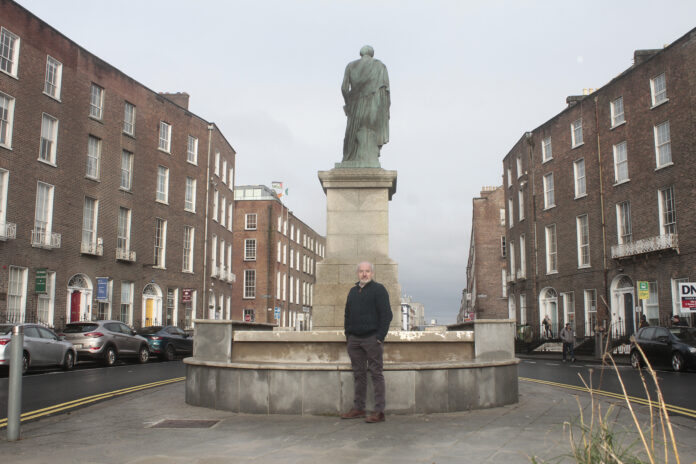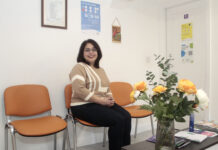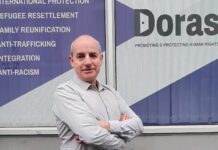
“ABOVE all be a decent human being.”
This sound and simple slogan for each of us in our daily lives is an important one, and despite its self-evident sentiment, it’s one worth remembering in these volatile and uncertain times.
This heartfelt message is the moral code by which Doras CEO John Lannon, and indeed the migrant and refugee non-governmental organisation he leads, go about their daily business.
The son of a Roscommon farmer, Lannon has been Doras CEO since 2020. Prior to that he served on the board, including four years as chairperson. John previously worked as a lecturer and researcher at the University of Limerick, specialising in project and programme management, and as a consultant with a range of international development and human rights NGOs.
Lannon has also served on the boards of Amnesty International Ireland and the Blue Box Creative Arts Therapy Centre. He holds an MA in Peace and Development Studies and a PhD in human rights information management.
The Limerick Post recently caught up with this public-spirited and altruistic individual, who has always put human rights activism and his dedication to promoting cross-cultural diversity at the forefront of his daily endeavours.
Taking a seat at his office on 2 The Crescent in the city centre, I quickly find John a composed and candid host, a man we could all learn a lot from.
I’m very keen to know where his humanitarian inclinations first came from.
“I’ve often reflected on where our values come from. I’m not really sure. I think really I just looked at the world as being a bit bigger than a 20-acre farm,” he tells me in a strong Roscommon brogue.
“I suppose my mother would probably have been the one that had more of a leaning towards helping people when I was younger. She was involved in local activities as best she could. She was a member of the Pioneer Total Abstinence Association. She was with the Irish Country Women’s Association, a few bits and pieces like that, and always got involved in helping,” he tells me.
“One of the things she did was to put a lot of her own time and energy into helping kids in the locality that needed additional supports. She would have always liked to have been a teacher, she wasn’t, so she tried to put that into practice. Her attitude towards helping others probably did shape me to some extent.”
After attending secondary school in St Mel’s College, Longford, Lannon then went to University College Galway where he earned his first degree in Electronic Engineering. It was soon after he finished his studies and started his working life in Limerick as a software developer and designer that he became actively involved in the Amnesty International group locally.
“I could have ended up studying anything to be honest, I just wanted to get to a different place where I could experience more of life. Things along the way like the protests in UCG when Ronald Reagan came in 1984 started to influence me. I was only starting to become engaged at that time, but 30 years later I’ve been involved in a lot of activism. I’ve always wanted to be part of social change and I want to continue trying to shape the future of all of us,” he says.
“I was involved in a peripheral sense in Doras in its early years, and other bits and pieces along the way. I’ve also been, and still am, actively involved in anti-war activities with Shannonwatch, and in supporting the work of the Ireland Palestine Solidarity Campaign.”
Community is key
After working for many years in the corporate world Lannon began his work in academia and earned a PhD in Human Rights Information Management.
“I was teaching and researching at the University of Limerick but then four and a half years ago the opening of CEO at Doras arose, and I moved from the strategic to the operational side of the organisation,” he tells me.
A journey that has now come full circle for Lannon since first moving in 1984 to Limerick, the city he calls home, he now finds himself in the unique position of being able create change from the ground up at community level.
“Community is key,” John insists.
“Protecting human rights is essential, ensuring that everybody in society has equal access to the resources that they need. Every day of the week we’ve got people coming into us in Doras either on the streets or at risk of being on the streets or living in conditions that they should not be living in. There are so many ways in which people are not only completely forgotten but completely excluded. ”
The Doras CEO wants the Irish government to reaffirm its commitment to upholding human rights and facilitating inclusion. He believes that our political leaders, as they traverse the bumps of a new five-year term, have an opportunity to address the challenges faced by the State relating to migration, international protection, and inclusion.
“It’s not easy to open the doors that we should be able to open for people when we’re advocating for them. Integration is really important. Social inclusion is really important,” he says.
“But then you also have to look at economic inclusion, political inclusion, all of that stuff that we try to address as well, which is really important.
“We work with people who can’t afford to keep warm. We’ve got others on the streets, especially if they’re excluded. They don’t get access to language courses because there’s not enough of them there. We’re trying to fill gaps because there are people who maybe don’t have the skills or the qualifications, or their qualifications aren’t recognised, so they can’t get the work that they should be able to because exclusion is their reality.”
If you need to take a stand, you should
One thing that struck me as I waited in the foyer of the Doras office for John to arrive was the sense of community and joy.
The place is bustling with a great sense of camaraderie. The world at large could use some of this at present. It’s hard at times not to feel despondent and lose hope for humanity with war, genocide, famine, and general upheaval in the world at present. What’s the answer, I ask Lannon, hopeful he has the answers.
“The phrase I keep coming back to is the importance of being a decent human being. I remember a really excellent program that I’ve seen delivered on trauma informed practices and trauma informed response and all the do’s and don’ts. At the end of it, the presenter summed it up and said: ‘You know, when it comes down to it, just act as a decent human being’. Approach others in the way that you’d like to be to be approached,” he says.
“So what that means then is that when you’re in a workplace or in your club or you’re on the streets or anywhere, if you see something that doesn’t look right, that you’re uncomfortable with in terms of your values, you go back and say, right, maybe I should do something about that.”
“If you need to take a stand, you should. If you need to report something to Gardaí, you do. Or if you can’t do anything at that point in time, then you look to what you can do in the future.
“I think it’s really important that we all use our voice. But again, it comes back to community. We’ve all got agency, we’ve all got the means to be able to affect things in a positive way.”








